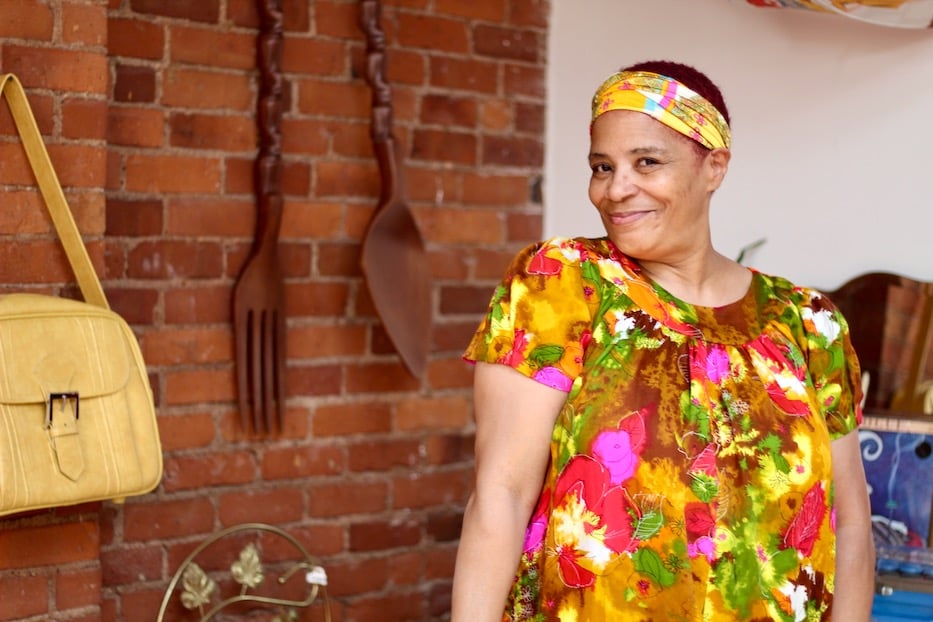
Black-owned businesses | Culture & Community | Economic Development | Fashion | Arts & Culture | Vintage clothing | Arts & Anti-racism
.jpeg?width=933&height=700&name=NoirVintage623%20-%201%20(1).jpeg)
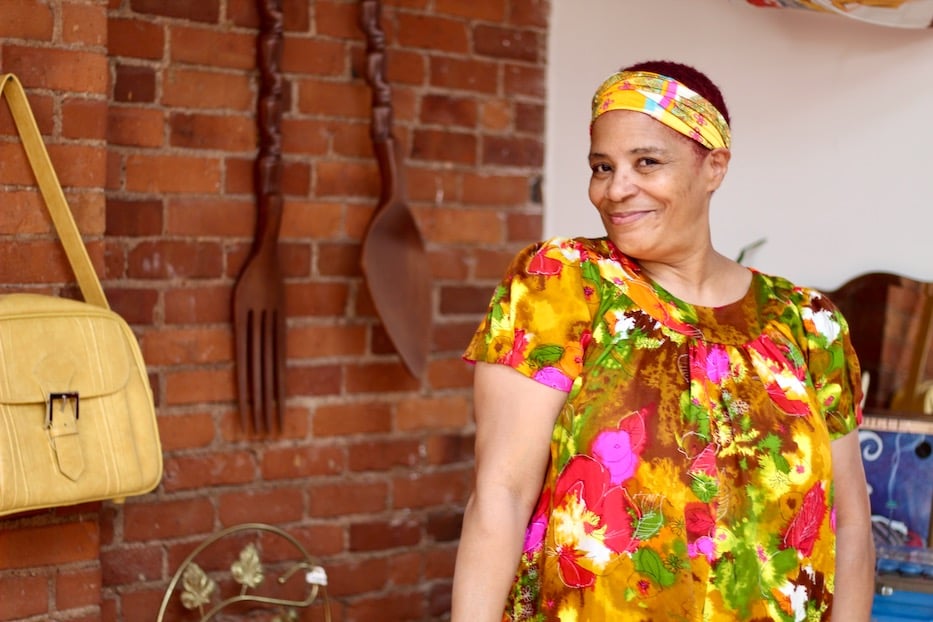
Owner Evelyn Massey in her new brick-and-mortar store. Lucy Gellman Photos.
At first, the shop feels like a film set, just waiting for its characters. The floorboards creak hello, announcing a person's entrance. A blue-and-gold chaise sits empty, expectant. Around the room, every dress tells a story: there are chenille and raw silk frocks embroidered with shimmering thread, black, purple and green sequins done five different ways, layers of sherbet-colored lace so soft and delicate they might tear if touched the wrong way.
Welcome to Noir Vintage & Company, a new storefront from longtime fashionista and sharp-eyed collector Evelyn Massey. Four decades after Massey first began shopping for secondhand clothes out of necessity, the 111 Court St. store is a longtime dream come to fruition. It marks the first time that Massey, who for years has sold online and at pop-up events, has been able to move clothes and vintage accessories out of a storage unit and into a single brick-and-mortar space.
This summer, it also doubles as the culmination of Massey's time in a new entrepreneurship academy from the Connecticut Community Outreach Revitalization Program (ConnCORP) and Quinnipiac University. More on that below.
"This is like walking into your home," she said last Friday, during a soft opening for the store with wine, cheese, and conversation that could (and did) go for hours. "It almost makes you feel like a true business owner if that makes sense ... I'm taking it all in because it was a vision that manifested. I’m very nervous, but I’m also very happy … It's a really big step."
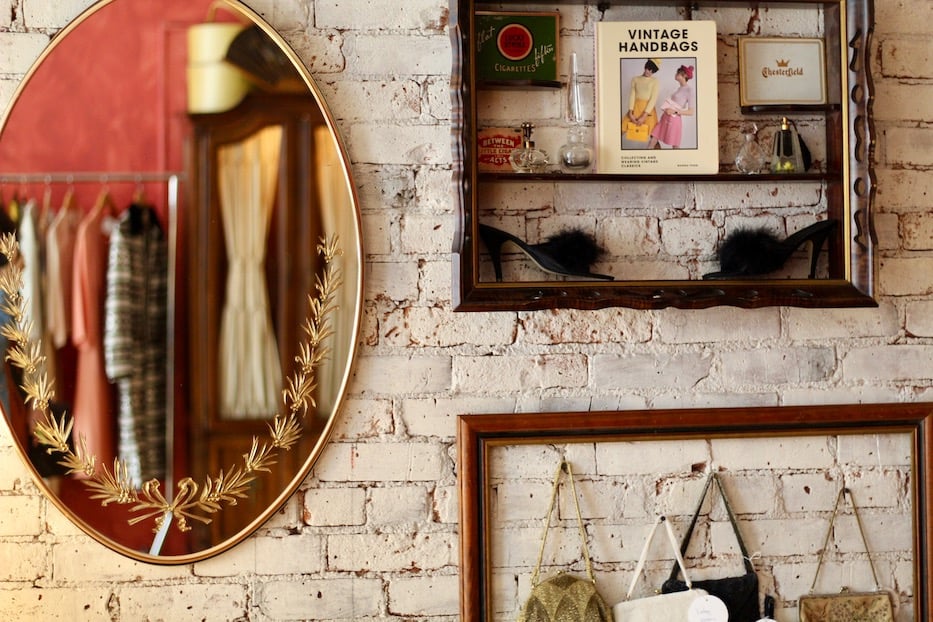
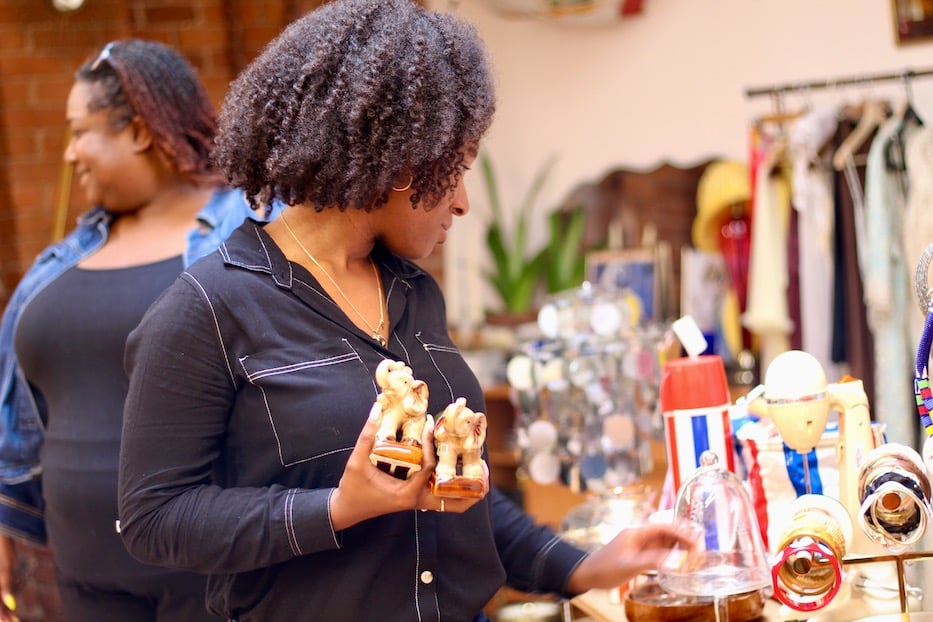
It's surreal to be in downtown New Haven, she added. Born in Virginia and raised in New Haven, Massey grew up loving clothes and fashion, unaware that it would one day be her whole career. As a teenager, she and her girlfriends shopped at thrift stores because they had to: Goodwill was their price point. It gave her a chance to spot hidden treasures among the bargain boxes and musty racks of clothes.
The more she did it, the more she realized that it was a unique—and more environmentally and economically friendly—way to cultivate her own sense of style. For years, she channeled it into her work as a stylist and makeup artist, which took her from New Haven to New York City to Washington D.C. and back. From a hobby, it became a passion and a job: she collected vintage clothes, jewelry, shoes, hats and accessories for years, formally going into business around 2018.
When she first founded Noir Vintage Co., the name came from her love for film noir and the French word for "Black," both of which lifted a specific standard of grace, panache and beauty that she wanted in every piece of clothing she found. Watching film noir and old black-and-white film more broadly, she said, she'd always marveled at how stylish characters were, even if they were running from the scene of the crime, trying to catch a villain, or staring down the barrel of a gun. It was also a genre that tipped its hat—although not frequently enough—to iconic Black performers, including Sydney Poitier and Harry Belafonte.
"You got these people looking so beautiful,” she said with a dreamy look behind her thick, red-rimmed glasses. They could be bolting down a dark alleyway, and still rocking a raw silk suit or dress with the perfect A-line waist. That was the kind of chic, polished style that she wanted her customers to find among her carefully curated racks of leather, suede, silk and twill. Some of her earliest sales took that vision beyond clothes, from etched wine glasses to all manner of purses, clutches, and totes.
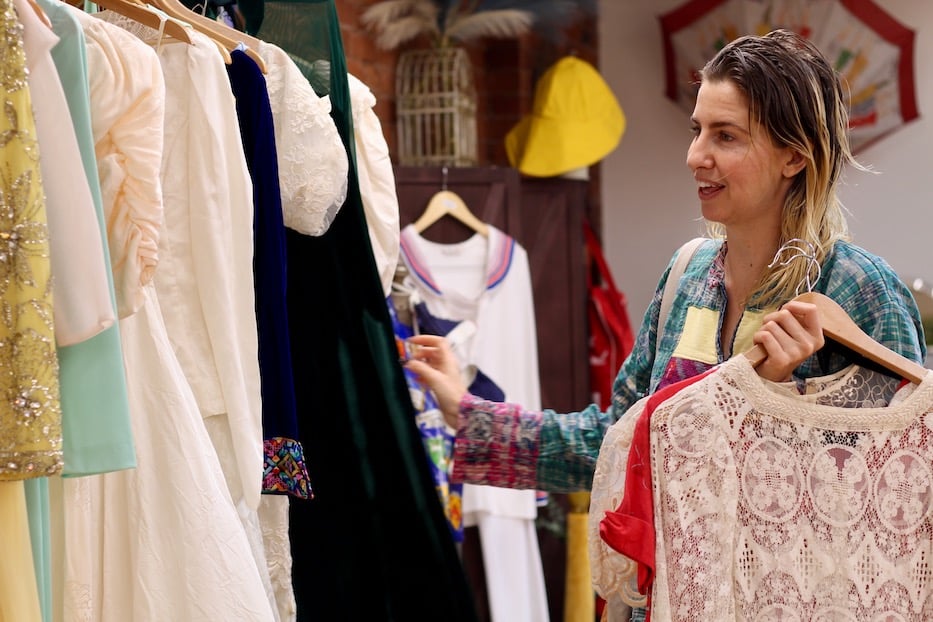
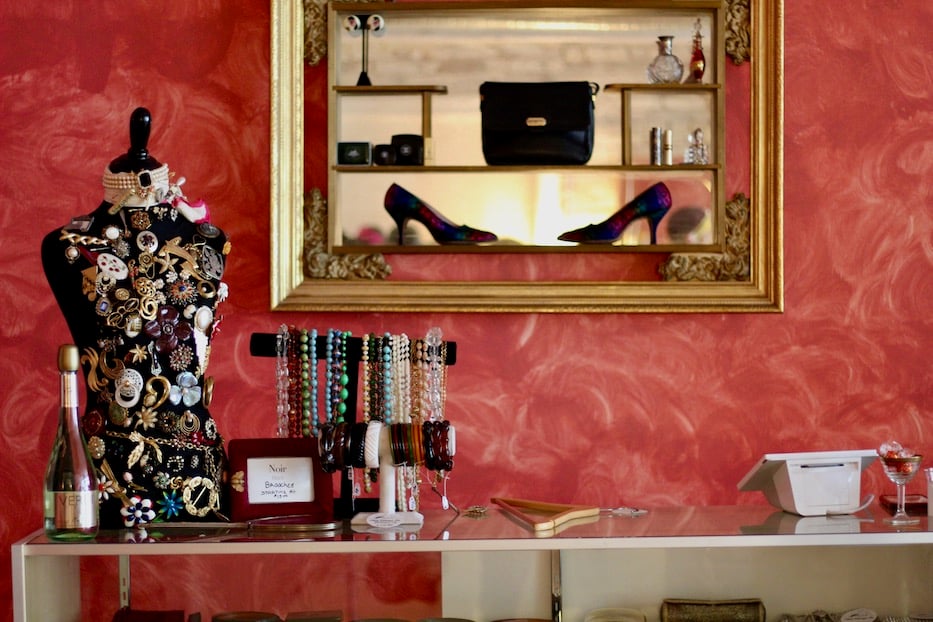
Top: Katie Jones, who ultimately bought a tight-fitting, floral-and-white hat that she wore to Shabbat services Friday night.
Initially, Massey brought her brand to pop-ups and art markets around the city and the state, opening a storage unit when her home became too small to hold her collection. Then when the pandemic hit in 2020, she found success with online sales, particularly on Instagram. As the world reopened, she did a mix of both, her trademark wooden sign welcoming customers back at bazaars and art fairs as she criss-crossed the city.
As her collection grew, so too did her vision for a retail space she could call her own. She knew where she wanted to put the vintage LPs, the playbills, the glossy-covered books on old handbags and church hats. She could imagine dresses and jackets separated by decade, with the 1930s, 40s and 50s in the front of the store and the 60s through the present in the back. Every time she spotted a new piece of clothing, she knew that a store had to be somewhere in her future.
So when she saw a "for rent" notice on Court Street while driving downtown in March , it felt like divine intervention. "I pulled over and parked!" she remembered with a laugh. Days later, she was back with all of the documents she needed to rent the space, a former salon that required renovations before she could move in. By last month, she was hanging clothes on the newly-painted walls, almost dancing from the Court Street sidewalk to the wood floors inside.
"It just feels like we're living in her dream," said her sister-in-law, the artist Tracey Massey, as she floated through the back room Friday, stopping at a sunshine-colored cotton dress with orange trim. Speaking aloud, she imagined it over a pair or platform sandals, ready for beach weather. "For it to come to life—this is 40 years of work!"
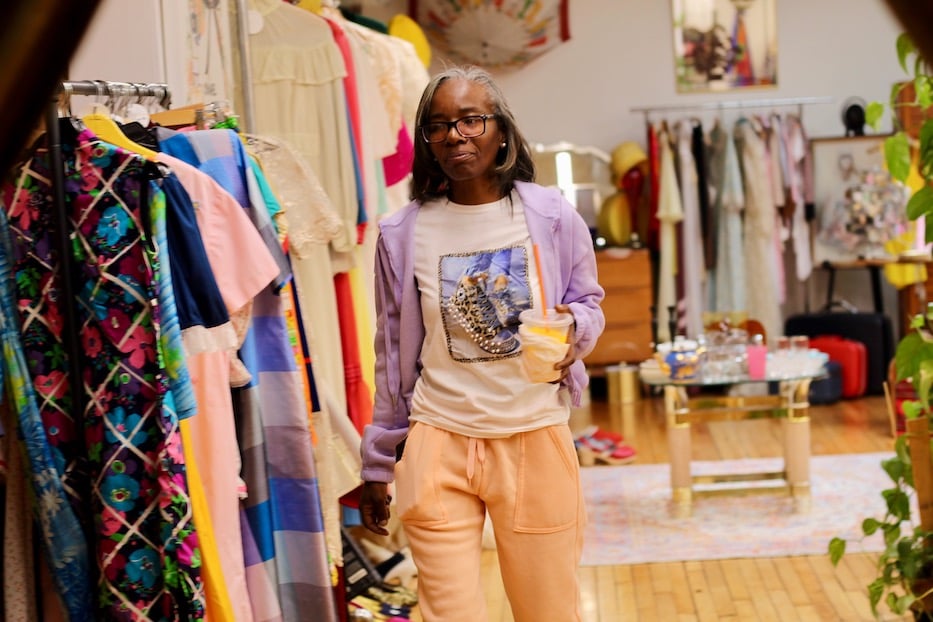
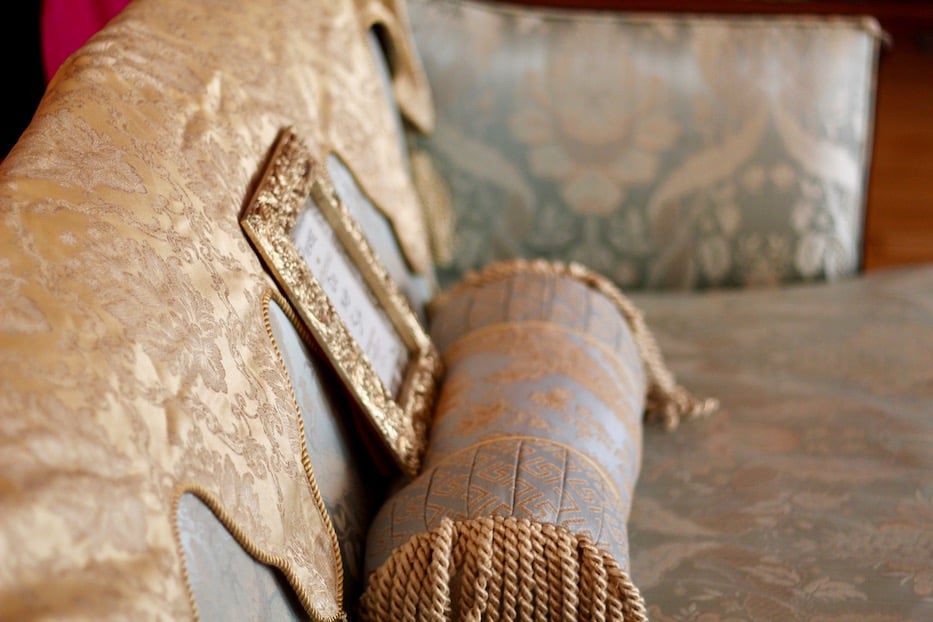
Tracey Massey: "It just feels like we're living in her dream."
Now open, the store is separated into two halves, in which a patron can jump back and forth through time (Massey, who is rarely still in the space, encourages it). At the front, where the wood floors shine against cochineal-colored walls and exposed brick, Massey has conjured the Harlem Renaissance, with something that feels like James Van Der Zee's 20th-century portrait studio in its drawn curtains and dramatic lighting.
Mirrors appear across the walls, with framed displays of shoes and handbags where shelving units might otherwise be. A playbill from George Gershwin's Porgy and Bess hangs around the corner from a vintage chaise.
There's a nod to film noir in the room—directors like Joseph Mankiewicz or Billy Wilder would be right at home here, and so would their characters—but something else, too. On a table with delicate gold legs, Craig Marberry and Michael Cunningham's Crowns peeks out, its pages fanned in a standing invitation. A lamp with creamy, off-white fringe casts a warm glow over a corner.
At points, it feels like a scene from Rebecca Hall's adaptation of Passing, with all of the glamor and buzz of 1920s Harlem, and none of the anxiety of living in the in-between. Beneath a series of black-and-white family portraits—the store is partly inspired by Massey's grandmother, to whom she pays homage—a rack of sleek black dresses hangs silently, waiting for the right pair of eyes and hands.
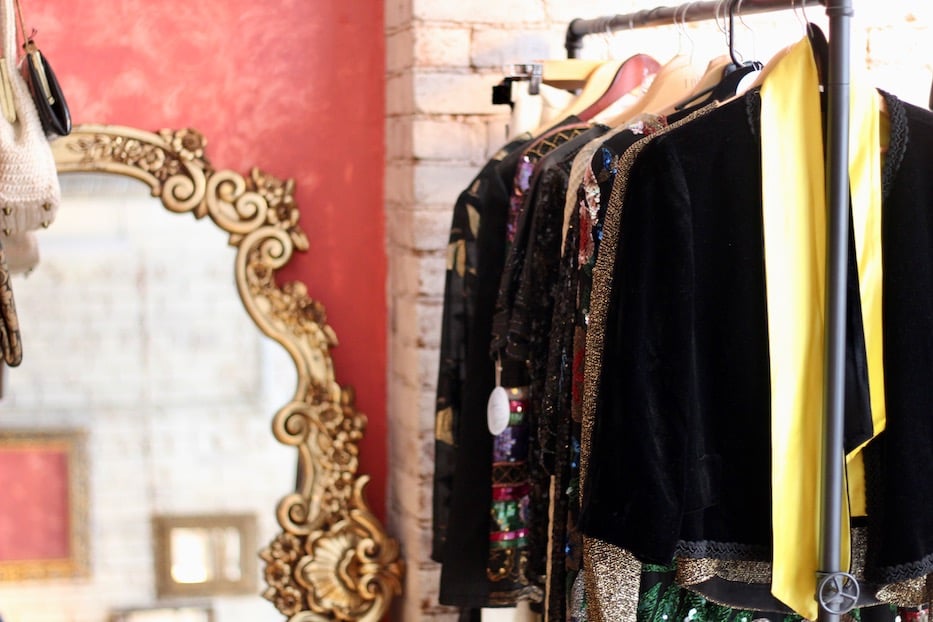
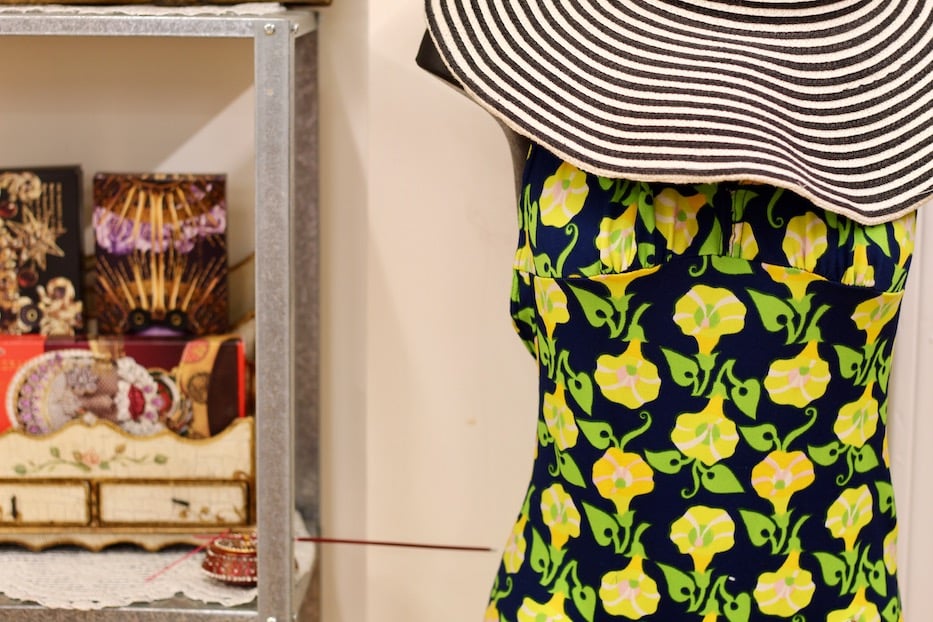
Through a doorway and drawn gold curtain, it's as if Massey has opened up a time capsule to the second half of the last century, and a patron can roll right through. On one rack, a long dress printed with pink and purple flowers looks as if it has stepped right out of a 1970s cocktail party, and settled gently on its hanger. Nearby, a navy-and-yellow bathing suit peeks out from under a striped sun hat, ready for a visit to Lighthouse Point Park.
Further into the room, Massey's pothos plant climbs up a wall in a spray of green and white, surrounded by clothes in every direction. There are puffy-sleeved party dresses, suede cowboy jackets with meticulous blue and red beadwork, and trench coats that look like they could solve a murder all by themselves. Three decades of button down shirts become a blur of stripes, checkers, flower prints and paisleys. In one corner, an original cotton Laura Ashley dress with ruffled edges waits for just the right person.
As they walked through the space, the LAB at ConnCORP's Aya Beckles Swanson and Jahkeeva Morgan said they were both excited to see it take shape. Last year, Massey started coming to ConnCORP's events, often bringing her business with her. Both were excited when she became a member of the entrepreneurship academy's inaugural cohort earlier this year. When Swanson walked in Friday afternoon, she was so excited that "I almost started crying," she said.
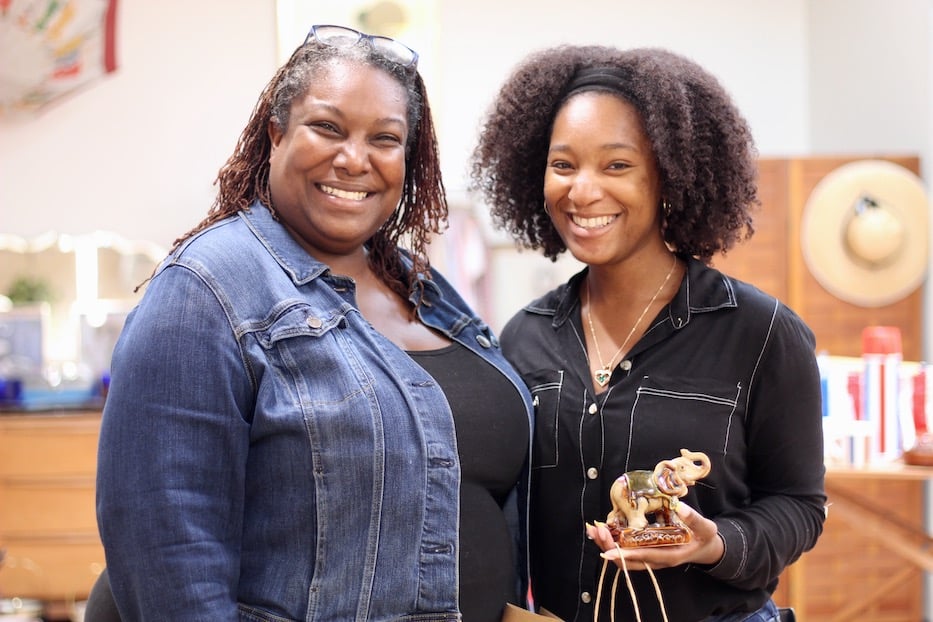
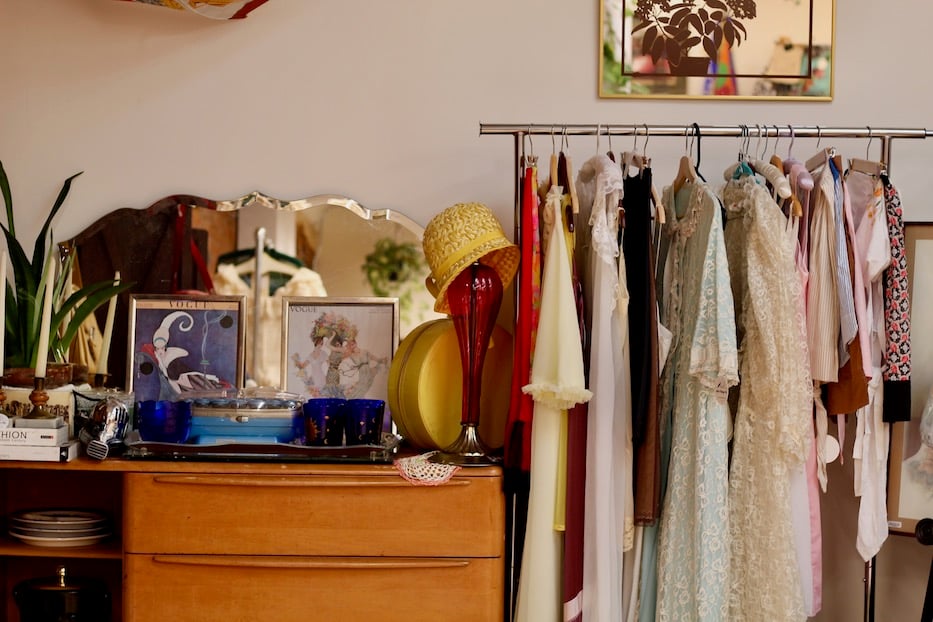
Top: Aya Beckles Swanson and Jahkeeva Morgan. Swanson is the executive director of the LAB at ConnCORP and Morgan is the director of programming.
The two didn't leave empty-handed; customers rarely do. On a table stacked with wooden bangles, a 1970s sequined lamp, silver tea tray and thermos emblazoned with the French flag, Morgan spotted two ceramic elephants that reminded her instantly of her mom. Within seconds, she had scooped them gingerly into one hand, where they remained until Massey wrapped them in tissue paper and sent the two back into the warm afternoon.
"When she told me about the space, I was ready to burst into tears," Morgan said. To see it ready for the public was almost overwhelming. She added that she was already excited to come back—perhaps with her mother in tow.
Back in the front room, Youth Arts Journalism Initiative (YAJI) Chief Curiosity Officer Markeshia Ricks found a fuschia sundress and matching cropped jacket, so airy it seemed to billow even on the rack. She held it up to the light, then made her way over to a makeshift dressing room to try it on. In between, she scrolled through Instagram, to show Massey a similar dress that the art dealer Luz Miriam Toro had worn to a summer gala for the American Ballet Theatre.
That dress, which Toro paired with a pre-Columbian necklace, came from the designer Han Feng. This one, Massey had spotted somewhere between estate sales, and pounced on.
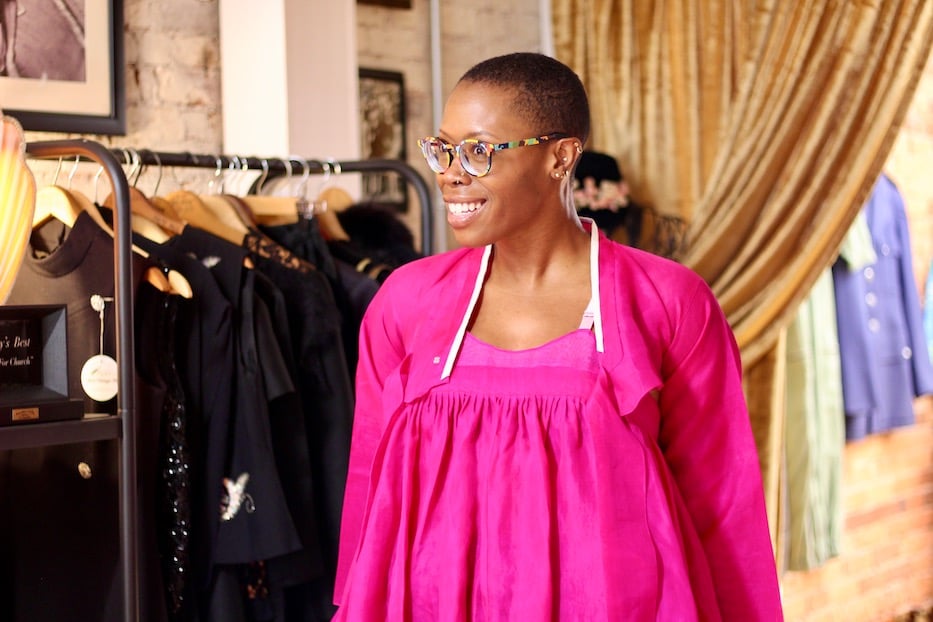
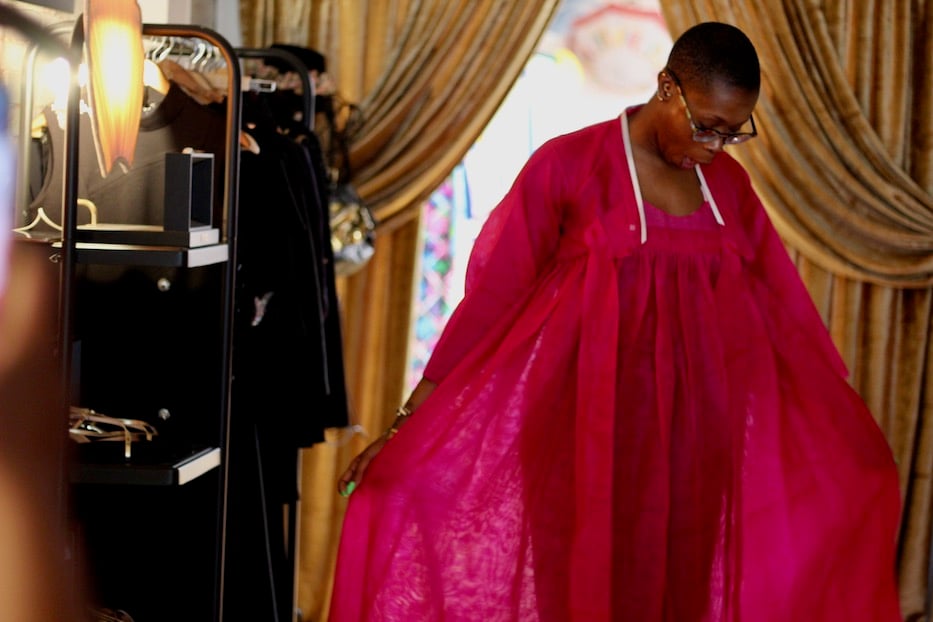
Markeshia Ricks, who walked away with the fuchsia dress.
As the dressing room became a whisper of changing clothes, Westvillian Katie Jones hovered by a rack of cotton, organza and velveteen, picking out a sheer, white lace dress with a crocheted collar. Taking it over to Massey, she began to dream up wardrobe pairings, from jeans and a tank top to a white slip that could make it a night on the town.
A curtain slid back open; Ricks came out into the front room and spun around, delighting at the fabric as it billowed out with the movement of her body. Massey, knowing she was about to part with the piece, beamed. She later helped Ricks pair it with a gold brooch that could go from work to play any day of the week.
Those are the kind of connections she wants to forge through vintage clothing, she said before the end of the afternoon. In addition to wine and cheese nights, she wants to have vintage film screenings, add children's clothes to the collection, and host salon-style discussions that encourage social interaction. The soft opening was just the beginning, she said—she can already imagine a mad rush before New Years' parties for which serious dress up is required.
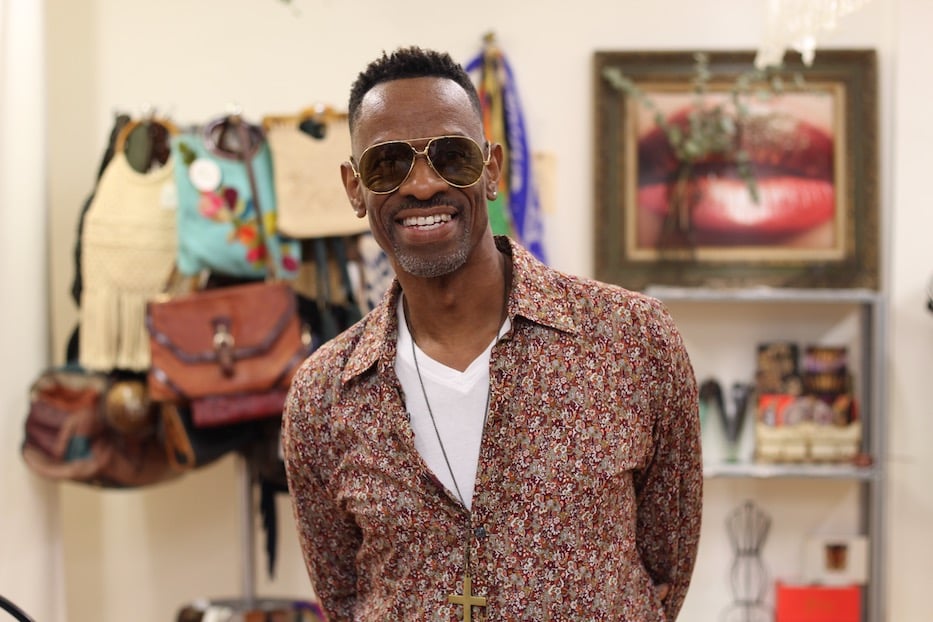
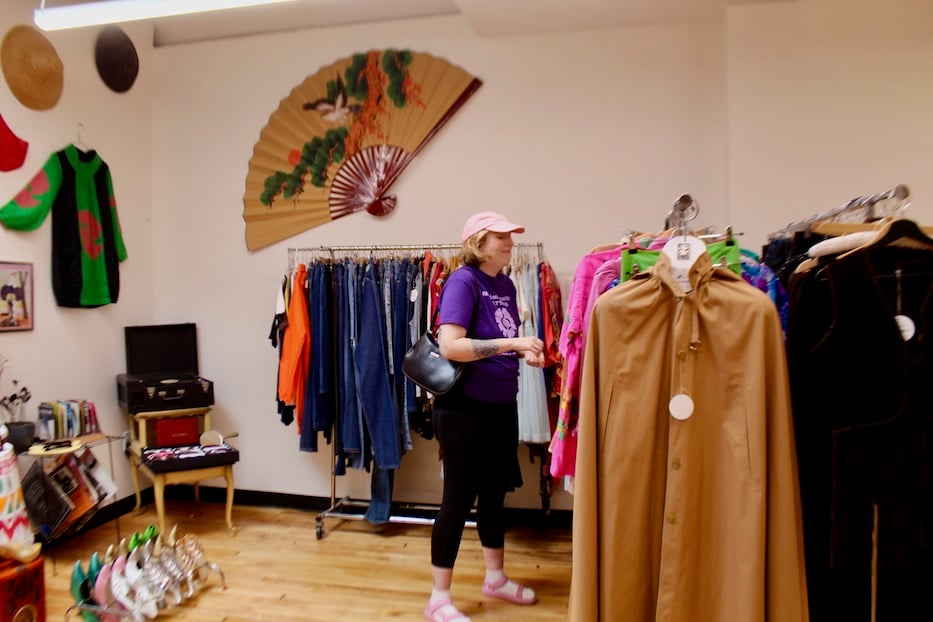
From the back, Massey's longtime friend Darren Vareen chimed in that he was excited to see the store take shape. A gospel singer based in Bridgeport, Vareen has watched Massey collect for years, and knows how hard she's worked to turn a love for style into a career.
Friday, he sifted methodically through a pair of wide-mouthed bargain bins, from which patrons could fill a bag for $20. A marbled silk blouse and pair of red culottes, the elastic waist ruched just so, made their way to the top.
"It's amazing, it's amazing," he said. "I helped her as much as I could. She just used what she had and it's amazing how it's coming together."

